|
|
|---|
| OBSOLETE: [Enlarged & Updated] Historical Section: www.antiquecannabisbook.com/chap2B/History.htm |
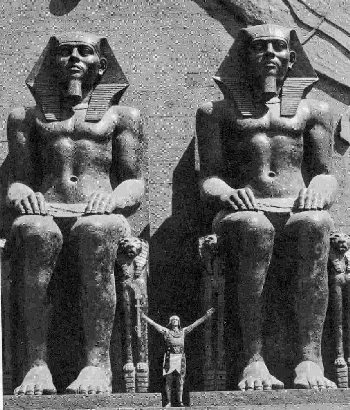
By far the very vast majority of modern day Egyptologists agree that Medical Cannabis (Medical Marihuana) was used by the ancient Egyptians in their medicines. This is in contradiction to what was thought to be the case right up until the early 1930's. In fact, most pre-second world war books dealing with ancient Egypt medicines in general exclude any conversation on the subject.
This discrepancy arose because in the mid 19th Century (when decipherment of the Egyptian language was first made possible) not all of the medicines found in the ancient papyruses were readily identifiable. As Paul Ghalioungui, a senior medical professor at Cairo University writes:[1]
"The papyri contain an extremely rich material medica of which only a fraction has hitherto been identified. This has been done through the patient work of Egyptologists who, by studying finds in graves, hieroglyphic inscriptions where plants figure near their names, and late Coptic texts, have helped considerable in this still unfinished work of identification."
Thus, it took awhile (well into the mid 20th Century) until the use of Cannabis could positively be identified and confirmed.
According to Lise Manniche [2] the following Egyptian hieroglyphs
 reads left to right |
 reads right to left |
|---|
- The Ramesseum III Papyrus (1700 BC)
- Eber's Papyrus (1600 BC)
- The Berlin Papyrus (1300 BC)
- The Chester Beatty VI Papyrus (1300 BC)
THE EBERS PAPYRUS
The Ebers papyrus was written over 1,500 years before the birth of Christ, thus making it the oldest known "complete" medical textbook in existence. In addition, many scholars claim that this text is actually a reprint of a much earlier text written or put together maybe 1,500 years before that.
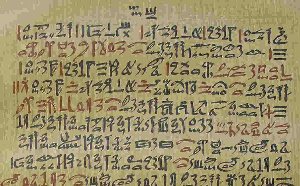
[Part of Plate XCVI - Courtesy of the "University of Lepzia"
Formula No. 821 (Location Plate #96, Lines 7-8)

Interpretation:
SuSm-t (hemp) ground in honey; introduced into her vagina.
[It is of interest to note that hemp seed oil was in used well into the mid 20th Century to treat inflammations - Examples:]
- The 1907 Merck Index (pp.132) lists that use of Cannabis seeds for emulsions to be used to relieve the effects of gonorrhea.
- "Hemp seed, in infusion, has been found very useful in after-pains, and in the bearing down sensation accompanying prolapsus uteri. ---"King's American Dispensatory" 1909;
- "When (hemp seed oil is) rubbed with water form an emulsion, which may be used advantageously in inflammations of the mucous membrane ---1927 "U.S. Dispensatory"
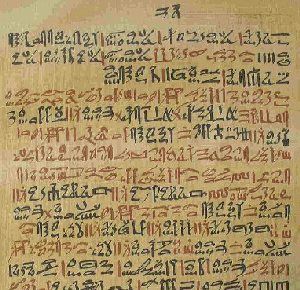
[Part of Plate LXXVIII - Courtesy of the "University of Lepzia"
Formula No. 618 (Plate #78, Lines 10-11)

Interpretation:
Remedy for a toe-nail (or finger)
Ingredients included honey, ochre smsm-t (hemp) and other ingredients
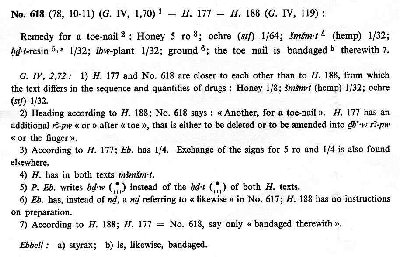
[From the book - Ebers Papyrus by paul Ghalioungui ]
To reiterate, the Ebers Papyrus is NOT the oldest known recorded mention of the medical uses of Cannabis, BUT it is the oldest known "complete" medical textbook in existence. That is what makes it so unique.
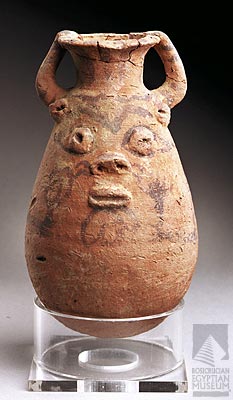
Did this Jar once contain Medical Marihuana?
In all likelyhood, probably YES.
Perhaps one of the first apothecary (medical) jars known. This is a good example of an Egyptian apothecary or medical jar (courtesy of the Rosicrucian Egyptian Museum -- www.egyptianmuseum.org." ). These jars could be the size of a small cup or a large jug and as such could be use to store medicines or simply as a dispenser. The face is that of the God of medicine Bes.

WANT TO KNOW MORE
Feel Free to ask for better pictures of the Ebers papyrus plates.
FOOT NOTES:
[1] - From the book "Magic and Medical Science in Ancient Egypt" by Paul Ghalioungu M.D., senior professor of medicine, Ain Shams University, Cairo
[2] "An Ancient Egyptian Herbal" By Lise Manniche, published under the auspices of the British Museum of London and the University of Texas. As a side note, Ms. Manniche is acknowledged as being the leading authority on the subject of ancient Egyptian Herbs and medicines by numerous Egyptologists.
[3] It should be pointed out that the Curator of the Rosicrucian Egyptian Museum pronounces it, "sm-sm-Et."
[4] Picture of Hesi Re
[http://nefertiti.iwebland.com/timelines/topics/medicine.htm]
Hesi the physician Hesi Re, Physician and scribe ca. 2650 BCE
http://www.highculture.8m.com/HesiRe.html
http://www.13beyond.com/hesy-ra/home.htm This picture was taken off a website, that borrowed it from another website, that borrowed it from a book, that borrowed it from a coffin that . . . .etc. If anyone out there knows who originated it, please let me know as I would like to buy that person a beer.
 Back to the Last Section |
 BACK TO CHAPTER 1 |
 On to the Next Section |